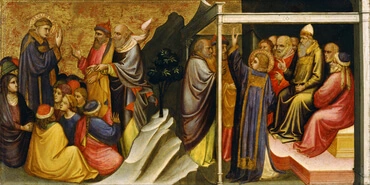The Inner Meaning of the Prophets and Psalms #127
127. Internal Meaning of Ezekiel, Chapter 4
Representation of the perverted church in the church. (2)
1-2 He should represent the falsities of the church, and the church besieged by them. (2)
3 He should represent the hardness of their heart, from which it is that they have no fear; (2)
4-8 he should also represent the church besieged by falsities of evil and evils of falsity. (2)
9-16 He should represent the falsification and adulteration of the sense of the letter of the Word, (2)
Elders

Like most meanings in the Bible this can change depending on context to a meaning perverted into the opposite. Instead of a mind full of knowledge and love of the neighbor, the love can be twisted around to pride in one's own self-intelligence and lead toward evil instead of good. The elders and chief priests who sat in judgment on Jesus in Caiaphas' house show the other side of the representation. Elders are mentioned in the Bible mainly in two ways: First the elders of Israel: and second the 24 elders seated about the throne of God in Revelation. In both cases, they mean wisdom, which comes from using the truths we've learned to do what's right in our everyday lives. The elders of Israel mean the chief things of wisdom in the church called Israel. The elders mentioned in Revelation 4 mean the wisdom of the highest heavens, and by extension the whole of the heavens.






